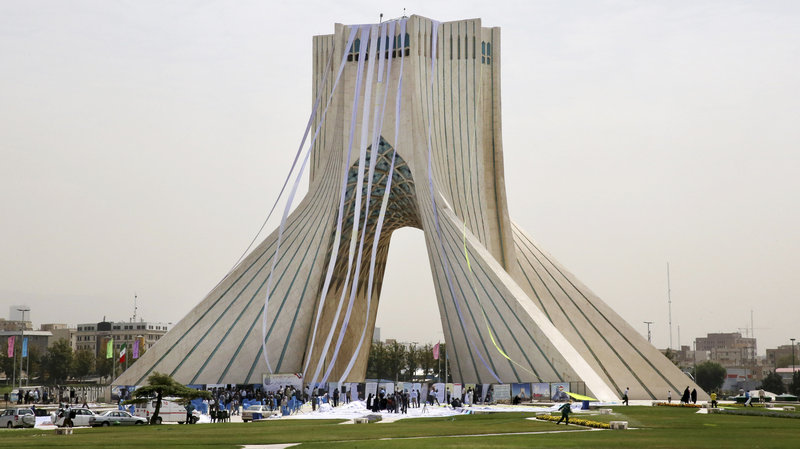PBS: Escaping Eritrea … [Read More...] about ካብ ውሽጢ ቤት ማእሰርታት ኤርትራ
How The Iran Nuclear Deal Could Reshape The Middle East
Is it a good deal?
President Obama and his detractors are headed for a ferocious debate on this question following the nuclear agreement announced Tuesday in Vienna between Iran and six world powers.
The evidence likely will trickle in over an extended period. What’s certain is that the narrow and highly technical negotiations on Iran’s nuclear program will influence the much broader trajectory of the Middle East in many ways, large and small. One impact was instant: Oil prices tumbled in response to the prospect of increased Iranian oil on the world market.

The nuclear deal was more than a decade in the making and bars Iran from moving toward nuclear weapons for at least another decade in exchange for relief from international sanctions that have been squeezing hard.
“Every pathway to a nuclear weapon is cut off,” Obama said Tuesday morning.
For Obama, it’s a signature diplomatic achievement that he regards as the best available option for keeping Iran out of the nuclear weapons club. Beyond that, he’s hoping for an added bonus in which Iran, its international isolation eased, will be more inclined to reduce rather than inflame Middle East tensions.
But the many critics, including U.S. Republicans, Israel and Saudi Arabia, say they don’t trust Iran to abide by the terms. And an Iran unshackled from sanctions will have even greater resources to stir up trouble in the region, they say.
Israel’s Prime Minister Benjamin Netanyahu issued a statement before the deal was formally announced, saying, “From the initial reports we can already conclude that this agreement is a historic mistake for the world.”
Of the many possible scenarios that could play out, there’s also a middle ground between the visions offered by Obama and his critics. The nuclear deal could proceed as planned, but Iran may remain an aggressive actor that continues to be at odds with the West and many Sunni Muslim states across the Middle East.
Here’s a look at the key issues, as well as the wider impact it could potentially have.
Iran Faces Tough Inspections: The U.S. says this is the most intrusive inspection regime ever placed on any country. The International Atomic Energy Agency will have regular access to all nuclear facilities, according to the agreement.
Without an agreement, Iran could kick out or limit IAEA access, making it far more difficult, if not impossible, to keep tabs on the nuclear program.
During the negotiations, Iran described the inspections in different language, calling it“managed access.”
One key question was over inspections at military sites. Iran has often balked at this, saying the military installations are not part of its nuclear facilities.
A compromise was reached that would allow inspectors to monitor military sites, but Iran could challenge requests for access, according to The Associated Press.
Iran’s ‘Breakout Time’ Will Be Lengthened: There’s broad consensus that Iran, at present, could produce enough highly enriched uranium to build a nuclear weapon within a few months.
The deal is designed to extend Iran’s nuclear “breakout time” to at least a year. The thinking is this would give the U.S. and others plenty of time to respond if Iran scraps the agreement and makes a sprint toward a weapon.
Iran will be required to reduce its current stockpile of enriched uranium by 98 percent,according to the White House. The remaining uranium it keeps will be at low levels, sufficient for a power plant, but nowhere near what’s needed for a weapon. Iran will also have to reduce by two-thirds its centrifuges that can enrich uranium.
This has not impressed critics who say Iran developed its program at secret, hidden facilities in the past and could do so again. Some say they would not be satisfied even if Iran sticks to the letter of the deal. They argue that Iran’s nuclear enrichment program is now entrenched in the agreement and that, after a decade, many restrictions will begin to fall away.
Sanctions Relief: Sanctions have been biting. Perhaps the most punitive measure took effect three years ago, when Europe and others stopped buying Iran’s oil, its main export. Iran’s oil exports have been down by roughly half, delivering a major economic blow.
Iran wanted all sanctions lifted immediately. The U.S. says inspectors must first verify that Iran has met all its obligations, and this process could take months.
The U.S., the United Nations and the European Union all have their own sanctions against Iran, and each would have to act independently to lift them.
Republicans in the U.S. Congress are authorized to review the agreement, but they will need a two-thirds majority to block the deal and override a veto by Obama.
From Iran’s perspective, the EU oil and banking sanctions are the ones that have the greatest adverse effect on their economy.
Assessing the overall sanctions picture, analysts have tossed around the figure of $100 billion in relief that could come Iran’s way in the short term.
The Broader Middle East: Obama has sketched an optimistic scenario in which Iran observes the nuclear deal, which builds trust and shows Iran the benefits of cooperation in the region and with the West.
One possible example: Both the U.S. and Iran are battling the self-described Islamic State in Iraq and Syria, though they insist there’s no formal collaboration.
If the nuclear deal goes well, it could open up the possibility for the U.S. and Iran to work together, formally or informally, for the first time since Iran’s 1979 Islamic Revolution.
But the critics see a much more pessimistic future.
Iran is emboldened by the deal, receives a badly needed influx of cash and pushes to further extend its influence in countries where it already plays a key role, including Iraq, Syria, Lebanon and Yemen.
Reaching a deal was tough. Some of the hardest questions are still ahead.
